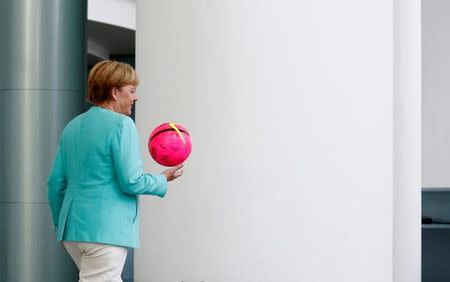Merkel, Hollande worried about Ukraine conflict ahead of meeting with Putin

BERLIN (Reuters) - Germany and France are "extremely concerned" about the situation in eastern Ukraine, especially along the line of contact between pro-Russian separatists and government forces, the two countries' leaders said on Thursday. German Chancellor Angela Merkel and French President Francois Hollande spoke ahead of an expected meeting next week with Russian President Vladimir Putin. In a joint statement, Merkel and Hollande strongly endorsed a ceasefire deal to take effect at the start of the new school year that was brokered by the trilateral contact group. The group is made up of Ukraine, Russia and the Organisation for Security and Cooperation in Europe. German Foreign Minister Frank-Walter Steinmeier, speaking at a meeting of OSCE ministers in Potsdam, sounded a more positive note, saying the latest ceasefire deal had sharply reduced military activities. Steinmeier, who holds the rotating OSCE chair, said the reduction was a hopeful sign after months of increasing - and sometimes deadly - fighting along the lines of contact. Steinmeier said the so-called Normandy format, a group that includes France, Germany, Russia and Ukraine, was also continuing to work on implementing a much violated truce agreed in Minsk, and its requirement for free local elections. The 12-point Minsk peace deal was engineered by Ukraine, Russia, Germany and France. Its aim was to end a conflict that the U.N. rights office said on Wednesday had killed more than 9,550 people, including soldiers, civilians and members of armed groups, since April 2014. Conditions including a complete cessation of fighting, a pullback of heavy weapons from front lines and release of prisoners of war have not yet been fulfilled, raising concerns the Minsk truce pact will not survive. "We're not ready to sign an agreement yet, but there is no other alternative than to try and bridge the remaining differences among the parties," a clearly weary Steinmeier said. "We have to work with all our might to move forward on the Minsk agreement, even if we only inch forward bit by bit." Merkel and Hollande said the ceasefire accord should lead to a lasting stop to the fighting. Merkel, Hollande and Putin agreed earlier to meet to discuss the situation in Ukraine on Sept. 4-5 in China on the sidelines of the G20 summit, the Kremlin said last week. (Reporting by Erik Kirschbaum in Berlin and Andrea Shalal in Potsdam; editing by Dominic Evans)

